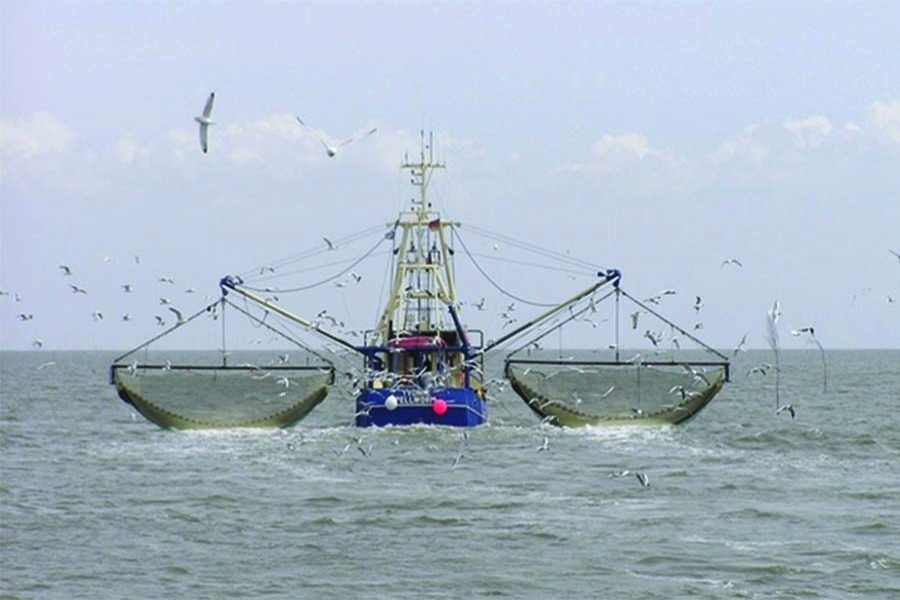Little progress in tapping blue economy potentials
Its contribution to GDP flattens

Published :
Updated :

Bangladesh appears to have made little progress in exploiting its "huge" blue economy potentials, according to a recent report.
The contribution of the ocean economy to the total economy was 3.66 per cent in fiscal year 2009-10, which fell to 3.33 per cent in fiscal 2015, said the report.
And in recent years, the contribution is hovering at around 3.0 per cent, economists and senior government officials told the FE.
Through the international court verdict in 2014, Bangladesh get sovereign rights over 118,000 square kilometres of maritime territory, 200 nautical miles (NM) of exclusive economic zone, and 354 nautical miles of continental shelf.
International experts define blue economy as a "sustainable ocean economy, where economic activity is in balance with the long-term capacity of ocean ecosystems to support this activity and remain resilient and healthy."
"The government announced conducting a survey through a specialised ship to assess the potential of our sea resources, but that has not started yet," said Dr Ahsan H Mansur, executive director of the Policy Research Institute (PRI).
"If we do not know what we have in our sea, how can we draw the plan to exploit it?" he said.
Rear Admiral M Khurshed Alam, foreign secretary (maritime affairs), told the FE the survey for assessing offshore energy resources will be conducted soon.
He referred to the recent awarding of the contract by the government to a Norwegian company for conducting the multi-client survey in the offshore areas to assess the potentials of energy resources.
The process of the survey was initiated more than a decade ago, however.
Commenting on the stagnation in exploiting the blue economy potentials, Dr Mansur said culturally, Bangladeshi people are not habituated to deep sea, which is also a barrier to extracting ocean resources.
For example, he said, Bangladeshis depend largely on freshwater fish for protein.
The demand for sea food is not significant at all in the domestic market, he said, adding due to the lack of demand, the activities surrounding the deep sea fishing have not gained momentum.
Consequently, sea food has a little share in the country's frozen food exports.
Oceans contributed US$6.2 billion to the Bangladesh economy in 2015, or approximately 3.0 per cent, said a report authored by Pawan G. Patil of the World Bank and Manfred Fernholz of the European Union.
About the composition of the Bangladesh's current ocean economy, they said it comprises largely tourism and recreation (25 per cent), marine capture fisheries and aquaculture (22 per cent), transport (22 per cent), and offshore gas and oil extraction (19 per cent).
As many as 30 million people are dependent on the country's ocean economy, a number that likely reflects both employees and household dependents.
Mr Alam said the government has initiated massive activities to exploit the blue economy potentials.
A high-level committee was formed under the direction of the secretary to the Prime Minister's Office to coordinate efforts and inputs to develop policies and operational strategies.
Blue economy has featured prominently as a policy objective in the Seventh Five Year Plan, which was completed in 2015.
According to the plan, "Blue economy comprises activities that directly or indirectly take place in the seas, oceans and coasts using oceanic resources and eventually contributing to sustainable, inclusive economic growth, employment, [and] well-being, while preserving the health of ocean."
"It includes activities such as exploration and development of marine resources, appropriate use of ocean and coastal space, use of ocean products, [and] provision of goods and services to support ocean activities and protection of ocean environment," noted the document.
Since 2015, the government has undertaken a number of consultations to elaborate the concept in the context of Bangladesh, most recently in the Second International Blue Economy Dialogue hosted by the Ministry of Foreign Affairs in late 2017
Mr Alam also mentioned that in 2017, the government established the Blue Economy Cell.
"This Cell has the mandate to coordinate with sectoral ministries to devise strategies to exploit blue economy potentials," he added.
Dr Mohammad Shahidul Islam, professor of geography and environment department of Dhaka University, said Bangladesh should have attained the capability to exploit the ocean resources much earlier.
"It remains a question whether we are at a stage to exploit the sea resources. Myanmar has found a substantial reserve of gas in their Continental Shelf, which is near to us," he said. "So, there is a huge possibility of discovering such reserves in our part too."
mirmostafiz@yahoo.com


 For all latest news, follow The Financial Express Google News channel.
For all latest news, follow The Financial Express Google News channel.